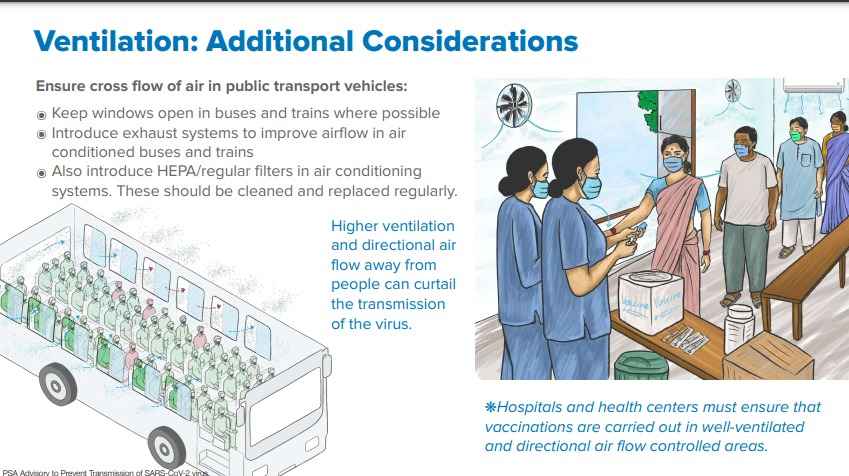Top expert bodies such as the Centres for Diseases Control and Prevention (CDC) and others have all pointed out that the risk of COVID-19 is very high in poorly ventilated places. The Indian government, too, on Thursday issued guidelines on indoor ventilation for homes and offices.
The advisory points out that saliva and nasal discharge in the form of droplets and aerosols by an infected person while exhaling, talking, speaking, singing, laughing, coughing or sneezing, etc are the primary modes of virus transmission. It noted that while droplets fall within two meters from an infected person, smaller aerosol particles can float in the air up to 10 metres or 33 feet.
It also explains that the virus can’t survive in the absence of a host, that is, a human being.
It highlights the importance of well-ventilated spaces in diluting the viral load of infected air in poorly ventilated places. “Ventilation can decrease the risk of transmission,” it notes.
“Just as smells can be diluted from the air through opening windows and doors and using exhaust systems, ventilating spaces with improved directional airflow decreases the accumulated viral land in the air, reducing the risk of transmission,” the advisory says.
Also Read: WHO’s New Guidelines: Wear Mask Indoors If Ventilation Is Poor
Also Read: Emirates Adds HEPA Filters In Flights To Combat COVID-19
Along with ventilation, other protocols such as masks, distancing, and sanitation are required to be followed by all members of communities.

The following ways are advised on how to increase ventilation:
- Introduce outdoor air in offices, homes, and larger public spaces.
- Air conditioners trap infected air and recirculate them. Improve vent-control or do not use them if infected people are likely to come.
- Strategic placement of fans, open windows and doors, even slightly open windows can introduce outdoor air and improve the air quality inside.
- Cross-ventilation and exhaust fans are highly effective in reducing the spread.
- Increase filtration in central air-conditioners and increase outdoor air intake wherever possible. HEPA H13 filters are believed to trap COVID-19 particles.
- In offices, auditoriums, shopping malls, gable fan systems and roof ventilators are recommended.
- Cleaning and replacement of filters are highly recommended for air conditioners.
Also Read: [Watch] Experts Recommend Using HEPA Filters; Virus Can Travel For 27 Feet As Aerosol
Also Read: How To Convert Fan Into Air Purifier For Just ₹120


